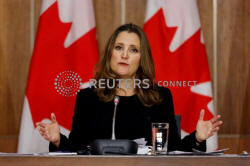Canada to go big on budget spending as pandemic lingers, election looms
 Send a link to a friend
Send a link to a friend
 [April 14, 2021] By
Julie Gordon [April 14, 2021] By
Julie Gordon
OTTAWA (Reuters) - Canada's Liberal
government will deliver on its promise to spend big when it presents its
first budget in two years next week amid a fast-rising third wave of
COVID-19 infections and ahead of an election expected in coming months.
Finance Minister Chrystia Freeland has pledged to do "whatever it takes"
to support Canadians, and in November promised up to C$100 billion
($79.8 billion) in stimulus over three years to "jump-start" an economic
recovery in what is likely to be a crucial year for her party.
Prime Minister Justin Trudeau's Liberals depend on the support of at
least one opposition group to pass laws, and senior party members have
said an election is likely within months as it seeks a clear majority
and a free hand to legislate.

Furthermore, by September, all Canadians who want to be vaccinated will
be, Trudeau has said.
Freeland has said the pandemic created a "window" of opportunity for a
national childcare plan, and that will be reflected in next Monday's
budget along with spending to accelerate Canada's shift toward a more
sustainable economy.
"It will be a green and innovative recovery plan aimed at creating
jobs," said a government source who declined to comment on specific
measures. The budget will aim to help those "who have suffered most" the
effects of the pandemic, the source said.
Critics say the government would be better to hold off on blockbuster
spending because the economy has shown it is poised to bounce back, and
to prevent the country from racking up too much debt.
"Clearly a garden-variety stimulus package is the last thing we need.
This is pile-on debt," said Don Drummond, an economist at Ontario's
Queen's University.
"The risk is that at some point interest rates are going to go up and
we're going to be in trouble," he said, pointing to the mid-1990s when
Canada's debt-to-GDP ratio skyrocketed, leading to rating agency
downgrades and years of austerity.
The Bank of Canada cut its benchmark interest rate to 0.25% to counter
the economic fallout of the COVID-19 crisis and has said rates will not
rise until labor market slack is absorbed, currently forecast for into
2023. That may change when it releases new projections on April 21.
[to top of second column] |

Canada's Deputy Prime Minister and Minister of Finance Chrystia
Freeland speaks to news media before unveiling her first fiscal
update, the Fall Economic Statement 2020, in Ottawa, Ontario, Canada
November 30, 2020. REUTERS/Blair Gable/File Photo

EXPANDING ECONOMY
More than 3 million Canadians lost their jobs to the pandemic. As of March,
before a third wave forced new lockdowns, only 296,000 remained unemployed
because of COVID.
Despite still-high unemployment levels in hard-hit service sectors, the economy
has expanded for nine straight months even as provinces have adjusted health
restrictions to counter waves of infections.
"Once we see sustained reopening, we do think that the recovery will have quite
a bit of momentum on its own," said Josh Nye, a senior economist at RBC
Economics.
"We think Canada's economy will be operating pretty close to full capacity by
this time next year," he said.
Economists surveyed by Reuters expect Freeland to project a deficit in the range
of C$133 billion to C$175 billion for fiscal 2021/22, up from the C$121.2
billion ($96.7 billion)
deficit forecast in November. https://tmsnrt.rs/3wSJPcm
The deficit for fiscal 2020/21 ended in March is forecast by the government to
top a historic C$381.6 billion ($304.5 billion).
Canada announced on Monday a C$5.9 billion ($4.7 billion) aid package for the
country's largest airline carrier, Air Canada, and said talks were ongoing with
No. 2 carrier WestJet Airlines Ltd and others.

(Reporting by Julie Gordon in Ottawa; Additional reporting by Fergal Smith in
Toronto; Editing by Steve Scherer and Peter Cooney)
[© 2021 Thomson Reuters. All rights
reserved.] Copyright 2021 Reuters. All rights reserved. This material may not be published,
broadcast, rewritten or redistributed.
Thompson Reuters is solely responsible for this content. |